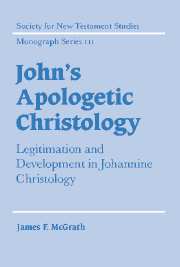Book contents
- Frontmatter
- Contents
- Preface
- Part 1 Introduction
- 1 Introduction: the development of Johannine Christology
- 2 A conflict setting and a distinctive Christology: setting the stage
- Part 2 Jesus and God
- Part 3 Jesus, Moses and Torah
- Part 4 Other issues and conclusion
- 16 Conclusion
- Bibliography
- Index of biblical references
- Index of authors
- Index of subjects
2 - A conflict setting and a distinctive Christology: setting the stage
Published online by Cambridge University Press: 22 September 2009
- Frontmatter
- Contents
- Preface
- Part 1 Introduction
- 1 Introduction: the development of Johannine Christology
- 2 A conflict setting and a distinctive Christology: setting the stage
- Part 2 Jesus and God
- Part 3 Jesus, Moses and Torah
- Part 4 Other issues and conclusion
- 16 Conclusion
- Bibliography
- Index of biblical references
- Index of authors
- Index of subjects
Summary
The conflict setting
In recent scholarship it has become widely accepted that behind the Fourth Gospel lies a debate between a group of Christian Jews and the leaders of their local synagogue, the main focus of which was Christology. Some scholars have detected other conflicts, for instance with Docetists, Gnostics or followers of John the Baptist. However, this work will focus on the conflict between the Johannine Christians and their parent Jewish community, as the latter appears to be the main dialogue partner in view in the Fourth Gospel. It will be useful, before discussing our topic further, to survey some of the evidence for such a conflict.
We may take as our starting point the clearest evidence, namely the hostility and objections expressed by characters in the Fourth Gospel who function as opponents of Jesus. In John 5.16, reference is made to ‘the Jews’ persecuting Jesus, and in 5.18 we are told that they tried to kill him. The reason that is given for this antagonism is christological: he was ‘making himself equal with God’. In John 6 we also find the group described as ‘the Jews’ ‘grumbling’ (verse 41) in response to Jesus' claim to have ‘come down from heaven’, and ‘arguing among themselves’ (verse 52) in response to Jesus' words about eating his flesh. Even his disciples found this teaching difficult, and many subsequently no longer followed him (6.60–1, 66).
- Type
- Chapter
- Information
- John's Apologetic ChristologyLegitimation and Development in Johannine Christology, pp. 48 - 68Publisher: Cambridge University PressPrint publication year: 2001



